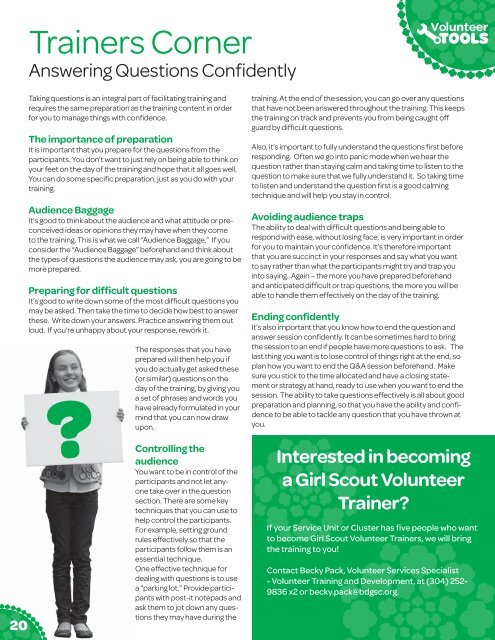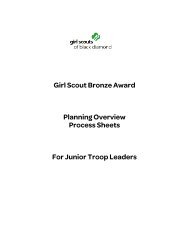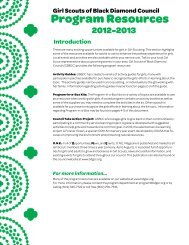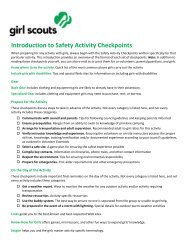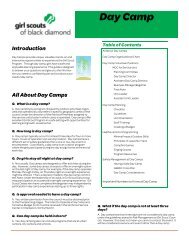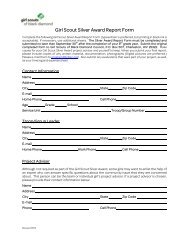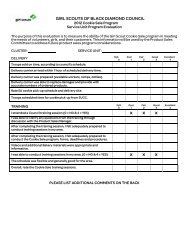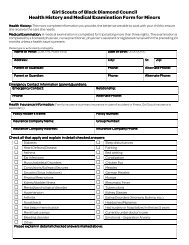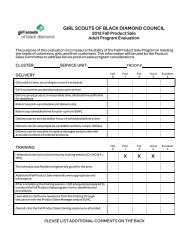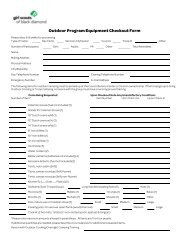Volunteer - Girl Scouts of Black Diamond
Volunteer - Girl Scouts of Black Diamond
Volunteer - Girl Scouts of Black Diamond
Create successful ePaper yourself
Turn your PDF publications into a flip-book with our unique Google optimized e-Paper software.
Trainers Corner<br />
Answering Questions Confidently<br />
<strong>Volunteer</strong><br />
TOOLS<br />
Taking questions is an integral part <strong>of</strong> facilitating training and<br />
requires the same preparation as the training content in order<br />
for you to manage things with confidence.<br />
The importance <strong>of</strong> preparation<br />
It is important that you prepare for the questions from the<br />
participants. You don’t want to just rely on being able to think on<br />
your feet on the day <strong>of</strong> the training and hope that it all goes well.<br />
You can do some specific preparation, just as you do with your<br />
training.<br />
Audience Baggage<br />
It’s good to think about the audience and what attitude or preconceived<br />
ideas or opinions they may have when they come<br />
to the training. This is what we call “Audience Baggage.” If you<br />
consider the “Audience Baggage” beforehand and think about<br />
the types <strong>of</strong> questions the audience may ask, you are going to be<br />
more prepared.<br />
Preparing for difficult questions<br />
It’s good to write down some <strong>of</strong> the most difficult questions you<br />
may be asked. Then take the time to decide how best to answer<br />
these. Write down your answers. Practice answering them out<br />
loud. If you’re unhappy about your response, rework it.<br />
The responses that you have<br />
prepared will then help you if<br />
you do actually get asked these<br />
(or similar) questions on the<br />
day <strong>of</strong> the training, by giving you<br />
a set <strong>of</strong> phrases and words you<br />
have already formulated in your<br />
mind that you can now draw<br />
upon.<br />
training. At the end <strong>of</strong> the session, you can go over any questions<br />
that have not been answered throughout the training. This keeps<br />
the training on track and prevents you from being caught <strong>of</strong>f<br />
guard by difficult questions.<br />
Also, it’s important to fully understand the questions first before<br />
responding. Often we go into panic mode when we hear the<br />
question rather than staying calm and taking time to listen to the<br />
question to make sure that we fully understand it. So taking time<br />
to listen and understand the question first is a good calming<br />
technique and will help you stay in control.<br />
Avoiding audience traps<br />
The ability to deal with difficult questions and being able to<br />
respond with ease, without losing face, is very important in order<br />
for you to maintain your confidence. It’s therefore important<br />
that you are succinct in your responses and say what you want<br />
to say rather than what the participants might try and trap you<br />
into saying. Again – the more you have prepared beforehand<br />
and anticipated difficult or trap questions, the more you will be<br />
able to handle them effectively on the day <strong>of</strong> the training.<br />
Ending confidently<br />
It’s also important that you know how to end the question and<br />
answer session confidently. It can be sometimes hard to bring<br />
the session to an end if people have more questions to ask. The<br />
last thing you want is to lose control <strong>of</strong> things right at the end, so<br />
plan how you want to end the Q&A session beforehand. Make<br />
sure you stick to the time allocated and have a closing statement<br />
or strategy at hand, ready to use when you want to end the<br />
session. The ability to take questions effectively is all about good<br />
preparation and planning, so that you have the ability and confidence<br />
to be able to tackle any question that you have thrown at<br />
you.<br />
20<br />
Controlling the<br />
audience<br />
You want to be in control <strong>of</strong> the<br />
participants and not let anyone<br />
take over in the question<br />
section. There are some key<br />
techniques that you can use to<br />
help control the participants.<br />
For example, setting ground<br />
rules effectively so that the<br />
participants follow them is an<br />
essential technique.<br />
One effective technique for<br />
dealing with questions is to use<br />
a “parking lot.” Provide participants<br />
with post-it notepads and<br />
ask them to jot down any questions<br />
they may have during the<br />
Interested in becoming<br />
a <strong>Girl</strong> Scout <strong>Volunteer</strong><br />
Trainer<br />
If your Service Unit or Cluster has five people who want<br />
to become <strong>Girl</strong> Scout <strong>Volunteer</strong> Trainers, we will bring<br />
the training to you!<br />
Contact Becky Pack, <strong>Volunteer</strong> Services Specialist<br />
- <strong>Volunteer</strong> Training and Development, at (304) 252-<br />
9836 x2 or becky.pack@bdgsc.org.


